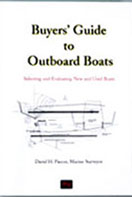Chapter 1
Basic Considerations for
First-time Buyers
Unlike most marketing media that hype boating with visions of paradise, eternal fun-in-the-sun pictures of bright, sunny days, calm waters and coconut palm studded white sand beaches with the ubiquitous scantily-clad mermaids somewhere nearby, this book is going to present you with a more realistic view of boat buying and ownership.
We start with the fact that it involves considerable responsibility and financial resources, plus elements of risk in the activity itself.
If you are adverse to risk taking, perhaps you might want to rethink your desire to become a boat owner.
One of the things that has long attracted so many people to boating in the past is the sense of adventure and the presence of danger.
Without the element of risk, many would find boating as boring as driving a car on a crowded road. After all, that’s one of the things we seek to get away from.
What Are the Risks?
The dangers of operating a boat are often not obvious. Unlike driving a car, a boat floats on a fluid, water, which can be shallow or deep, clear or murky, moving or not moving.
Dangers include running aground, getting caught in storms, becoming lost, and becoming stranded due to engine failure or running out of fuel.
There is also the risk of sinking resulting from striking a submerged or floating object, as well as the failure of some internal plumbing component.
With a car, you can park it in a driveway or garage and more or less forget about it.
Not so with a boat, for a boat left unattended for long periods of time while afloat may sink, or at the least will deteriorate at a rate that is disconcerting, for boats require a substantial amount of care.
The newcomer to boating should be aware that despite all our high technology and the fairly good safety record of boat builders, to go boating safely one still needs certain knowledge and skills.
The need to learn something about seamanship has not disappeared.
Seamanship is not just a term that applies to ships on the high seas; it also refers to the skill needed to operate vessels safely on rivers, lakes and bays where storms, wind and waves may not be the only danger.
Another important factor goes beyond yourself. As boat owner and operator, you are responsible for the safety of your passengers.
That means that if you don’t know what you’re doing, you can be held liable for your mistakes that end up in injury to others.
There is a very good reason why, in days of old, the captain of a ship possessed the powers of a sovereign: Ultimately he is responsible for the ship and its passengers since, while in the midst of the ocean he cannot call upon the services of a policeman.
In the immediacy of a crisis, all decisions are his to make, including the taking of all actions to ensure safety. Thus, the responsibilities of boat ownership are greater than for any other type of vehicle you could own.
Many boat owners attempt to forgo the effort it takes to learn how to read and use charts, and navigation aids which are the mariners “road maps”.
This lack of knowledge is most often the cause of running boats aground, which can damage the hull and engines.
In addition to nautical charts, the intelligent boater also learns to read the weather. He knows by experience the very serious dangers of getting caught in severe weather.
Seaworthiness
Ranking very high among the most common causes of boating accidents is the failure to maintain a boat in seaworthy condition, so let’s be sure we understand what the term seaworthy means.
Seaworthiness does not have an absolute definition, but is actually a legal term that is relative to how a vessel is to be operated. Here is the dictionary definition:
The fitness of a vessel for a particular voyage with reference the condition of its hull and machinery, the extent of its fuel and provisions, the quality of crew and officers and adaptability to the type of voyage proposed.
In other words, the boat is made reasonably safe to do what the operator intends to do with it for the proposed outing only. And by “reasonably safe” we mean as judged by a knowledgeable seafarer.
Moreover, in the event of a mishap that led to litigation of any type, it would be the opinions of other experts as to what constitutes seaworthiness that would apply, and not merely the judgement of the vessel owner or operator.
The point here is that whereas with road vehicles we have a precise set of rules and laws that define a motorists behavior, in the realm of maritime law, the rules are less well defined owing to the broader range of circumstances and risks to which a vessel is subjected.
A car that is not road worthy may simply end up not drivable, and so the driver just gets out and walks or calls a taxi.
When the engines of a boat quit running, the boat and passengers are likely to be subject to great danger, such as being washed up on the rocks, sinking, or being swept under a low bridge.
So it is that the primary risks involved in owning and operating a boat involve the maintenance condition of the boat, weather and navigation skills.
Most boating accidents occur as a direct result of the boat owner having insufficient knowledge and experience. That is because seaworthiness is directly related to a boat’s maintenance condition.
The most difficult part of boat ownership is the work of learning how to keep a boat in seaworthy condition so that it remains afloat, and the engines in good condition so that they don’t break down and leave you stranded at the worst possible time.
A boat owner who knows little or nothing about his boat and its systems is a boat owner who has no capacity for knowing when something may be about to go wrong.
That is why preventive maintenance needs to be of paramount importance to boat owners.
Boats are similar to airplanes in that when something goes really wrong, you can’t just get out and walk away from the problem. Poorly maintained boats are much more prone to suffering crippling breakdowns.
A boat owner should be a mechanically inclined person who has some interest in things mechanical and electrical and is not afraid or disinclined to learn more.
Far too many boat owners today are the sort who have no interest in things mechanical, and who attempt to rely upon others to see to it that their boats are kept in good condition.
And more often than not, such people will attempt to pay maintenance people as little as possible since maintaining a boat is costly.
The faulty logic in this should be painfully obvious. In all things in this world, we basically get what we pay for, so that if we pay for cheap help and service, that is what we get.
The bottom line is that people who get the most out of their boats and boating are the sort who love boats for all that they involve, including the work, the adventure and the dangers.
They see a challenge in every aspect, from fixing a bilge pump, to painting the bottom, to learning the art of navigation. If this describes you, then the odds are high that you’ll love boat ownership and boating.
“There is nothing so fine as just messing around with boats.” - Anonymous
“Ya gotta be nuts to own a boat” - An opinion expressed by thousands.
“A boat is a man’s first love and first wife. Second loves and wives are optional and ill-advised.” - Barnacle Bill
Definition of BOAT: Break Out Another Thousand
No one thinking about buying his first boat should approach it with the idea of going boating without any training and education.
There are simply too many risks to do that, and not expect to be courting disaster. One does not necessarily have to attend a boating course, though that is surely a good idea.
Self education is usually good enough, so long as you are serious about it.
Perhaps most people learn about boating through friends with boats. After all, experience is the best teacher. One thing that you’ll learn about boat owners is that they love to spout off about their hobby, so that all one needs to do is just ask in order to get an earful.
Going out on other people’s boats is a great way to get hands-on experience. But what if you don’t know anyone who owns a boat?
Then it’s either one of the many boating courses available, or buy the boat and see how many new friends you suddenly develop!
With your own boat, it should not be difficult to find an experienced boater who’s willing to spend a bit of time to help you.
Let me tell you about how I ended up becoming a crewman on a world-famous ocean racing sail boat.
I simply started hanging out with small sail boat owners. These were people I did not know, but I hung around them and expressed my interest in learning.
It wasn’t long before one day a boat owner said that one of his crewman had failed to show up for a race, and he needed an extra hand. And so it was that I was off to the races. From there I worked my way up, just by being available when needed.
Here’s another true story. This fellow bought a 26’ boat when his neighbor died and his widow offered him the boat for half of what it was worth.
He hadn’t planned on buying a boat at this time, nor one this big, but he found the deal just too good to pass up.
Never having operated a boat before, he and his brother would trail the boat down to the ramp on Saturday mornings, launch it, drive it around in a short circle and then load it back on the trailer and go home.
He did this three times before one of the locals at the ramp noticed what he was doing and asked him about it.
Our new boat owner explained how he came by the boat, that he didn’t know anything about it, and was reading a couple of books trying to learn. In the meantime, he was testing out some of the things he had learned.
The other guy rolled his eyes toward the heavens and said, “Geeze, buddy, you need help that bad why didn’t you just ask someone?
Put ‘er back in the water and me and my buddy Calvin will help you get started.” By mid afternoon, they had covered a few miles of the waterway, and our new boat owner had not only learned a bit of boat handling but navigation aids as well.
From there he met other experienced boat owners that he invited to go out with him, and from whom he learned much. Four years later he was making fishing trips to the Bahamas on his own.
HOME > Buyers' Guide to Outboard Boats >


